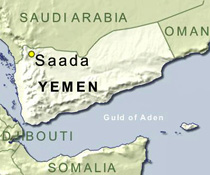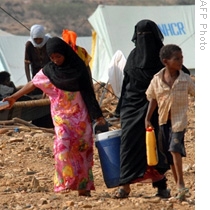Cairo
11 October 2009
There appears to be no immediate let-up in the latest eight week old escalation of the off and on five year conflict between the Yemeni government and Zaidi Shi'ite rebels in the northern province of Saada. Both sides appear to be trying to improve their positions in the build-up to an impending ceasefire, following international mediation efforts to bring a halt to the fighting.
 |
Meanwhile, the leader of the Shi'ite rebels, Abdelmalik al-Houthi, says that he is willing to participate in negotiations toward a settlement, according to a plan outlined in September by a block of Yemeni opposition parties.
Al Arabiya TV reports that the government is welcoming the Houthi rebel leader's offer to negotiate to put an end to the bitter fighting which has devastated parts of Saada province. The United Nations says up to 150,000 people in Yemen have been forced to flee their homes since the intermittent fighting first began in 2004.
The Yemeni government defense ministry declared, in a statement late Friday, that its forces had killed 100 rebels and wounded 280 in the current round of fighting, "inflicting heavy and painful blows" to them.
Arab League Secretary General Amr Moussa stepped up mediation efforts to end the conflict, after arriving in the Yemeni capital Sanaa, for a three-day visit, Tuesday. Some analysts think that the push to reach a ceasefire has momentarily intensified the conflict.
Professor Ahmed Abdul-Karim Saif, who teaches at the University of Sanaa, says that both the government and the Houthi rebels are trying to "improve their positions" in the build-up to what appears to be an imminent ceasefire.
"Each party among both the Houtis and the government are trying to make their situation better on the field," Saif said. "This will strengthen and enhance their situation and stand in the negotiations. This is expected very soon in Cairo."
The coming 72 hours, argues Saif, is a very critical period, as both parties jockey for position and fighting intensifies.
 |
| Displaced Yemenis from the northern Saada province carry water to their tent at a camp set up by the United Nations High Commissioner for Refugees in Mazraq in Hajja region, 10 Sep 2009 |
Meanwhile, humanitarian efforts are being stepped up by the international community to bring relief to the thousands of refugees from the conflict.
U.N. Emergency Relief Coordinator John Holmes visited the conflict zone, Friday, during a three-day visit to Yemen, inspecting one of five refugee camps in the north of the country.
Holmes also complained that his agency has received only $3.8 million of the $23.5 million that was called for in early September to help victims of the fighting.